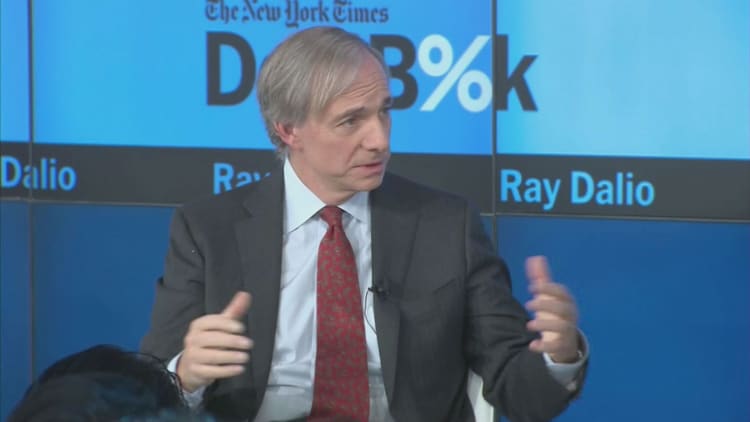
After years of rapid internal growth, the world's biggest hedge fund appears to be slowing down.
The $154 billion hedge fund, Bridgewater Associates, run by the billionaire Ray Dalio, is known for hiring hundreds of people every year. Yet it is now telling recruitment firms to cancel interviews with prospective employees, according to three people briefed on the matter.
In recent weeks, dozens of interviews were canceled and advanced negotiations with prospective employees were cut short by the firm, those people said.
More from The New York Times:
WhenYahoo Ruled the Valley: Stories of the Original 'Surfers'
TheTop 20 Venture Capital Investors Worldwide
ABank Too Big to Jail
And some of the firm's external recruiters have been told Bridgewater will not use them for the time being, said the people, who were not authorized to discuss the matter publicly. Bridgewater emphasizes secrecy in its communication with investors and the external recruiting firms, and the people requested anonymity because they did not want their relationship with the firm to be affected.
It was unclear whether the suspension of recruiting in some areas was temporary or a reflection of a new push to gradually shrink the size of the firm. At the moment, there does not appear to be any talk of layoffs. The firm employs 1,500 people, most of them at its sprawling headquarters in Westport, Conn.
Still, the signs of a pullback in recruiting at Bridgewater are emerging at a time when a number of hedge funds, struggling with poor performance and unhappy investors, are starting to cut back. For example, William A. Ackman's $12 billion Pershing Square Capital Management, whose main fund is down 19.1 percent this year, recently fired a dozen employees.
The average hedge fund is up 1.6 percent this year through the end of June, according to the Hedge Fund Research Composite Index, the broadest gauge of hedge fund performance. By contrast, the Standard & Poor's 500-stock index is up 5.76 percent.
Bridgewater is not immune to the industry's pressures. It has had uneven performance in its two main portfolio funds, and at least one prominent investor has pulled out a significant sum of money over the last year.
The firm's flagship Pure Alpha fund, which makes broad bets on global economic trends, is down 8.8 percent, while its All Weather fund, which the firm contends will "perform well across all environments," is up 10.4 percent.
But last year, those performances were reversed: The All Weather fund lost investors 6.9 percent, while Pure Alpha gained 4.7 percent.
Over the last two years, the University of California's Board of Regents, the endowment for the state university system in California, has withdrawn the $550 million it had invested with Bridgewater.
Jagdeep Singh Bachher, the chief investment officer for the University of California regents, said in an interview that Bridgewater made money for the endowment, but that a decision was made to focus on investment strategies that would do best. He also said there were some concerns about the future direction of Bridgewater's leadership.
It has been a tumultuous year for the firm. Bridgewater publicly prides itself on what it calls "radical transparency" in its dealing with employees, but is very private about discussing its operations. The firm is in the process of reorganizing its core management committee that reports directly to Mr. Dalio, who founded Bridgewater in 1975.
This year, Greg Jensen, a co-chief investment officer who was seen as the heir apparent, was removed from his role as co-chief executive after reports of a schism between him and Mr. Dalio. Bridgewater hired Jon Rubinstein, a former Apple executive who had worked closely with Steven P. Jobs, to replace Mr. Jensen.
Bridgewater has publicly denied there were any internal rifts. The firm is known for its unusual culture, where employees are encouraged to question and sometimes admonish one another. Mr. Dalio encourages all employees to read "Principles," a little white book that each is given and that includes 210 motivational tips like, "Don't worry about looking good — worry about achieving your goals."
Publicly, the firm attributed the management shake-up to the need to "strike the right balance" for Mr. Jensen, who Bridgewater said was balancing too much as both co-chief executive and co-chief investment officer.
Mr. Dalio, who is 66, has created a core committee of managers that share top executive positions as part of a transition plan for when he retires. The firm has communicated to investors that the arrangement is part of a "planful transition from a founder-led boutique to a professionally managed institution."
Nevertheless, it has worried some investors.
"The management transition, in my view, it just didn't feel smooth," Mr. Bachher, of the University of California regents, said.
Despite the management transition and the apparent slowdown in hiring, Bridgewater continues to plan to expand its headquarters.
Connecticut has given Bridgewater $22 million in financial aid in an effort to keep the firm from moving its headquarters out of the state. The money is expected to go toward the expansion of Bridgewater's complex in Westport as well as its facilities in Wilton and Norwalk, according to the State Bond Commission.
Bridgewater recently received tentative approval from Westport town officials for its expansion plan, according to public documents filed in Westport's town hall. The plans would include the construction of an underground parking garage and another building at the Bridgewater campus at 1 Glendinning Place, the firm's headquarters tucked away in the woods and surrounded by streams.
It is accessible only by a nondescript road.

